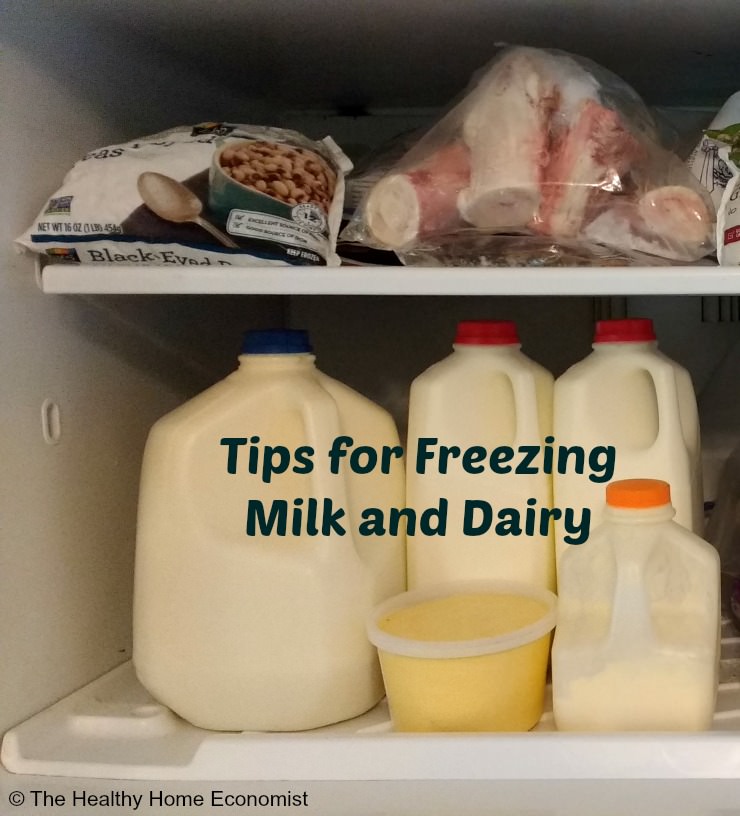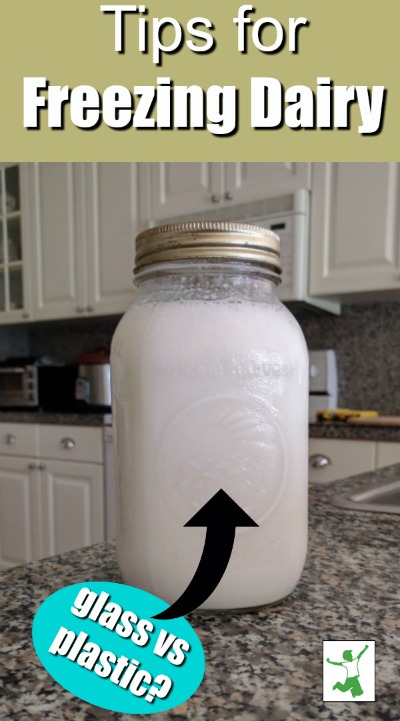How to freeze milk and other types of dairy to best protect nutritional value and the types of containers that are best for preserving taste and texture.

I’ve coordinated a large buying club that supports several local dairy farms for nearly two decades. During that time, I’ve answered all manner of questions on freezing milk and proper use, storage, and fermentation of dairy products both pasteurized and fresh from the cow (or goat).
It’s exciting to witness an ever-increasing number of people seeking to source food locally. We now even have a local farm in our community that produces a small amount of fresh milk from water buffalo!
The tricky part of the trend toward local food production is that a learning curve and education process are necessary with regard to knowing exactly where your food comes from and how it is produced.
This is something that is entirely unnecessary when you robotically buy dead, fractionated, frankenfoods on a grab-and-go basis from the dairy aisle of the supermarket.
Below are the most common questions I have been asked over the years about how to properly handle and store milk and other dairy products. If you are new to sourcing your dairy from a local farm, I hope this information saves you some time getting up to speed on the process.
Does Freezing Milk Damage It?
The most frequent question I get asked about milk is can it be frozen? The reason people are interested in freezing milk is because, in some parts of the world, fresh dairy is hard to come by, so folks are organizing groups to drive long distances to pick up larger quantities once a month for multiple families.
The trick with that is how to best keep the milk fresh for drinking until the next dairy road trip.
The good news is most definitely yes! You can freeze milk with no problem.
Both pasteurized and raw milk can be frozen, and freezing milk does not harm its nutritional profile or destroy enzymes and probiotics in the case of raw dairy.
Dr. Weston A. Price, author of the nutritional classic Nutrition and Physical Degeneration found that even after being frozen for one year, butter suffered no degradation in either enzymes or fat-soluble vitamins. (1)
Types of Containers
The trickiest part about freezing milk, cream, butter, buttermilk, yogurt, or kefir is choosing the most appropriate container to use.
Plastic vs Glass
I personally do not choose and would not recommend glass for freezing milk and other types of dairy due to the danger of breakage.
If you must use glass for whatever reason, make sure the container is not completely full and the lid is cracked or open to release any pressure that builds up.
The linked article provides more tips on choosing and using glass versus plastic containers for safely freezing food.
Shake it up Before Freezing
When freezing raw milk or nonhomogenized, low-temp pasteurized milk, be sure to shake it up really well first before putting it in the freezer.
This distributes the cream evenly. It’s a good idea to take the jug out and shake it up once or twice more before it is totally frozen for the same reason.
How to Thaw
Note that once cream top milk has thawed, sometimes the cream will have a slight texture to it and might not feel completely smooth on the tongue like it did before it was frozen.
You will be happy to know that this little bit of grittiness with the cream portion of thawed milk isn’t a safety or nutritional problem, but it does bother some people.
Knowing how to properly freeze milk and other fresh from the farm dairy products is also helpful when traveling. This article details how to easily travel with dairy on an airplane.
Other Tips for Handling Local Dairy
While the question of freezing milk is definitely the most common question I receive as a dairy club coordinator, the second most common concern usually takes the form of a frantic email or text late in the afternoon or evening of dairy pickup day:
Sarah, I completely forgot about my raw dairy in the trunk of my car, and it has been sitting in there all day! Has it gone bad or can I use it anyway?
How to Know if it’s “Gone Bad”
Quality raw, grassfed dairy is expensive, and forgetting about it in the trunk of your car all day long is surely a heart-stopping event! The good news is that the raw dairy hasn’t gone “bad” sitting in your car even on a hot day.
Milk going “bad” is a concept that has evolved in our language as a result of the rise of pasteurization and sterilized factory food.
Only dead, pasteurized milk that is devoid of enzymes and probiotics goes putrid or “bad” and must be thrown out as a precautionary measure when it has not been fully refrigerated for a period of time.
Note that throughout most of human history, raw milk and dairy were never refrigerated and rarely consumed fresh.
Milk was usually clabbered or fermented in some way before consumption. (2)
Raw milk has the benefit of inherent probiotic cultures that not only protect it from an invasion of foodborne pathogens but also protect against spoilage.
When raw milk comes to room temperature, the activity of these beneficial probiotics in the raw milk increases, as they more rapidly consume the lactose (milk sugar) during this time hastening the process of transforming the fresh milk to a clabbered state.
Hence, if you’ve left your raw milk in your car for a while, you can safely re-refrigerate when you get home and use it as you would normally.
Shortened Shelf Life
The only catch is that the raw milk won’t be fresh for drinking for as long. For example, if your raw milk normally stays fresh tasting for drinking for two weeks in the refrigerator before naturally souring, then it might only last one week or a few days if you forgot to refrigerate it right away after dairy pickup.
In comparison, when pasteurized milk goes past the “use by” date stamped on the carton, it should be immediately discarded as the risk of foodborne pathogens from the putrid milk is high.
No Longer Fresh for Drinking?
When raw milk is no longer fresh for drinking, on the other hand, it has simply begun the process of naturally souring into clabbered milk, a drinkable yogurt-like product which is how humans usually consumed raw milk prior to the advent of modern refrigeration.
When raw milk has clabbered, you don’t throw it out. You simply use it for something else like scrambled eggs, puddings, or sauces. This article outlines the many ways to use soured raw milk.
Do you have a question or answer about freezing milk or the handling of fresh dairy you source from a local farm? Please share in the comment section.









Hi Sarah! Thank you for all the work you put in to research and experience and your willing to share your knowledge and wisdom with us.
Would blending the thawed raw milk help with the texture issue or would it even matter?
Thank you!!
It might help a bit. It won’t fully recover the smooth texture though in my experience.
Sarah, do you have any opinion on how quickly cultured butter from raw milk goes bad when kept in the fridge? Will it have an obvious taste / texture change? Could it still be used in baking?
It lasts for months in my experience. It will gradually get cheesier in flavor, so if it gets too strong for you, just use for baking. Strong cheesy butter is amazing for grilled cheese sandwiches too!
Hi Sarah,
I get raw buffalo milk from the village after 2-3 hours of milking (some family members live in a village). I want to freeze this buffalo milk for my baby (2-year-old) for 3-5 days. Should I ask to the family members at village to immediately pasteurize it after milking and then transport to me? or Should I pasteurize after receiving the milk (after 2 hrs)? or Should I freeze it after receiving without pasteurization?
What should be good parameters in terms of microbiological and nutritional point of view?
Waiting for your response.
This article will give you pointers on how to evaluate how safe and clean your raw milk source is and whether it is safe to drink or not. https://www.thehealthyhomeeconomist.com/how-to-drink-raw-milk-even-when-unsure-of-your-source/
Before I started on real foods, before I even heard of raw milk, we used to drink commercial pasteurised milk. If it went sour, we used it to bake, or we made cottage-cheese out of it. It made very nice scones and pankakes. And even white sauce. It never made anybody sick. I never threw sour milk away (unless it grew mould too)
I’m surprised to hear you say that sour commercial milk can’t be used for anything.
It’s just a more sour kind of sour, and it degenerates much faster than the raw milk does.
Here in South Africa, even pasteurised milk is very expensive.
People either give it away or repurpose it.
Using sour pasteurized milk is dangerous as it has soured due to pathogenic activity. Raw milk sours because of probiotic activity. Big difference!
Hi Sarah, does Raw milk needed to be boiled before drinking ?
If I can’t get Raw Milk, what’s the best choice to buy from at the store ?
If you boil raw milk, then you’ve lost all the benefits of it and destroyed much of the vitamin content. If you can’t get raw milk, there is no dairy milk that is good to drink including organic. But, what you can do is take low temp pasteurized, nonhomogenized organic milk and culture it into yogurt or kefir. That is a good alternative.
Hi Sarah, my father bought me raw goats milk that was in my fridge for two days.
I have a baby 11 months old and I am not 100% sure about the source of the milk. I was wandering is there a way to make sure that the baby can drink the raw milk without the danger of getting anything from it?
Should I pasteurize it, boil it or freeze it for two weeks? What is the most safe way to give the raw milk to a baby when you are not sure about the source and without losing all the beneficial ingredients? Thank you very much!!!
Once thawed, will raw milk have a slight smell? And if so is it ok to use for kefir and yogurt
Once you thaw frozen raw milk, it should not have a slight smell. I have never frozen yogurt or kefir, but I know folks who have and say it works pretty well (not perfectly). Slight texture issues when thawing apparently.
Can I thaw and then refreeze immediately? (Not something I did purposely)
Probably not a good idea.
Thank you for all the time you spend researching and spreading the good word!
How long is raw goats milk good for after it is completely thawed?
Can I freeze just the cream from my raw milk?
Yes you can. Raw cream freezes very well!